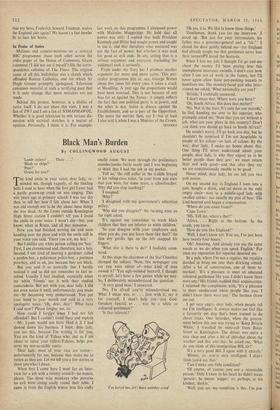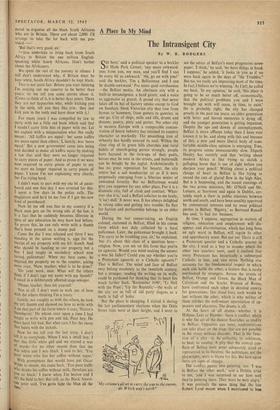Black Man's Burden
By COLLINGWOOD AUGUST
'Lamb cutlets? . . . There . .
'Mash or chips?' 'Peas?'
'Gravy for you?'
Ttin kind smile in your voice, dear lady, re- minded me, though vaguely, of the tinkling bells I used to hear when the first girl I ever had a partly grown-up crush on was singing. This was years ago at primary school. I was too shy then to tell her how I felt about her. When I was old enough not to be shy about these things she was dead. At the Lyons outside Kensington High Street station I couldn't tell you I loved the smile in your voice. I wasn't shy—but, you know, when in Rome, and all that nonsense.
Now you had finished serving me and were handing over the plate and with the smile still in your voice you said, 'There you are, my boy.'
But I dislike any white person calling me 'boy.' First, I am circumcised and, therefore, not a boy. Second, I am tired of hearing a gardener called a garden-boy, a policeman police-boy, a postman post-boy, and so on, just because they are black.
But you said it so naturally that I hardly noticed it and so did not remember to feel in- sulted. Usually I feel insulted, especially when my white 'friends' say it with their studied camaraderie. But not with you, dear lady. I did not even notice it until, unfortunately, you made me—by becoming very embarrassed. You put your hand to your mouth and said in a very apologetic voice, 'Oh, dear, dear! What have / said now? Please forgive me, sir.'
How could I forgive when I had not felt offended? But I couldn't stand there and explain —Mr. Lyons would not have liked it if I had slowed down his business. I hope, dear lady, you see this, because I'm writing it for you. You are the kind of Yahoo who, just as I am about to curse your fellow-Yahoos, helps pre- serve my not-so-stable sanity.
Dear lady, most of your race are rotten— unfortunately for me, because they make me as rotten as they are. Let me tell you a few stories to show you what I 'bean.
When first I came here I went for an inter- view for a job with a county council—no names, please. The three wise monkeys who perceive no evil were sitting cosily round their table. I came in from the English winter into this stuffy smelly room. We went through the preliminary mumbo-jumbo fairly easily and I was beginning to think that I had the job in my pocket.
'Tell us,' the stiff collar in the middle brayed in his ruling-class voice, 'in your form you state that you were, for some years, a schoolteacher. Why did you stop teaching?'
'I resigned.'
'Why?'
'I disagreed with my government's education policy.'
'Why did you disagree?' the running nose on the right asked.
'It's against my conscience to teach black children that they are inferior to white children.'
`So you disagree with your employers and, when you do, you just leave them like that?' the thin dry gorilla lips on the left snapped his fingers.
'What else is there to do?' I foolishly coun- tered.
At this stage the chairman of the Star Chamber changed the subject. 'Now, this newspaper you say you were editor of—what kind of man owned it?' You ugly-minded buzzard, I thought to myself, let's have a few games while we may. So, I deliberately misunderstood the question.
'A very good man,' I answered.
'No, I'm afraid you've misunderstood me. What I mean was, er . . . [out with it, say it for yourself, I shan't help you—you God- forsaken fascist] er . . . was he a white or coloured gentleman?'
Is that relevant?'
'I'm bored too, have another coup' 'Oh yes, it is. We like to know these things.'
'Gentleman, thank you for the interview.' I stood up. 'But just for your information, his father was a governor-general and a "sir."' I closed the door gently behind me--for England had already taught me that gentlemen never lose their tempers41.1I hated the bastards.
When I lost my job, I thought I'd go and see about the money I'd been paying into this unemployed insurance swindle. I don't care hoW often I am out of work in the future, but I'll never again allow those pen-pushing weasels to humiliate me. The monkey-faced god who inter- viewed me asked, 'What nationality are you?'
'British,' I truthfully answered.
'I don't mean that. Where were you born?' 'Oh, South Africa. But does that matter?'
'No. Not in the least. It's only for our records,' he lied, handing me over to his superior, who promptly asked die, 'Now that you are without a job, what are your plans in this country? Don't you think you should go back to South Africa?'
He needn't worry. I'll go back one day, but he shouldn't be surprised if I'm not hospitable to people of his colour—or lack of colour. By the way, dear lady, I make no bones about this. One thing I'll never understand about your people, dear lady, is why, they expect us to be better people than they are: we must return their evil with good—and this after they say we are constitutionally unable to be good'.
Never mind, dear lady, let me tell you two pub stories.
On my second day in England I went into a pub, bought a drink, and sat down in the onli empty chair—next to a middle-aged lady with swollen ankles: not exactly my pint of beer, The kind-hearted soul began a conversation.
'Where do you come from?'
'Cape Town.'
`Mh. Tell me, where's that?'
'Africa... . Right at the bottom. In the south, you know.'
'How do you like England?'
'Well, I don't know yet. You see, I've just been here twenty-four hours.'
'Ohl Amazing. And already you use the same words as we do when you speak English.' For once my reputation for repartee deserted me.
In a pub, where I'm not a regular, the regulars decided to bring me into their drinking school. After a lot of conversation, one of them re- marked: 'It's a pleasure to meet an educated coloured gentleman like you. I didn't know there were any.' His friends nodded their acquiescence. I returned the compliment with, 'It's a pleasure to meet uneducated white people like you. I didn't know there were any.' The barman threw me out.
I get very angry, dear lady, when people tell me I'm intelligent. It always makes me feel like a favourite pet dog that's been trained to do clever tricks. One Saturday, when the govern- ment before this one was trying to 'Keep Britain White,' I travelled by mini-cab from Baker Street to Kensington. The driver was quite a nice chap and after a bit of chit-chat about the weather and this and that, he asked me, 'What do you think of this immigration Bill, sir?'
'It's a very good Bill. I agree with it entirely.' `Blimey, sir, you're very intelligent I didn't think you'd say that.'
'Can I make one little condition;?'
'Of course, of course, you are a reasonable person.' Only I knew in his heart he didn't mean 'person'; he meant 'nigger,' or, perhaps, at his kindest, `darkie.'
'Well, you see, my condition is this. I'm pre-
pared to organise all the black South Africans Who are in Britain. There are about 2,000. I'll arrange to take the lot back with me pro- vided--' 'But that's very good, sir.'
'—you undertake to bring back trom South Africa to Britain the one million English- speaking white South Africans. Don't bother about the Afrikaners.'
We spent the rest of the journey in silence. I still don't understand why, if Britain must be kept white, South Africa shouldn't be kept black.
This is not quite fair. Before you start thinking I'm making out my country to be better than yours, let me tell you some stories about it. (Come to think of it, it is better than yours. There they are not hypocrites who, while kicking you in the teeth, tell you they like you: they just kick you in the teeth and have done with it.)
For many years I was compelled by law to carry with me a little red book which said that I needn't carry little bits of paper with me. Let me explain with a misquotation what this really meant : 'All kaffirs are equal : but some kaffirs arc more equal than others.' I, luckily, was 'more equal.' But a new government came into being and decided to make all kaffirs equal by making a law that said they were no longer required to carry pieces of paper. And to prove it we were now required to carry pieces of paper to say we were no longer required to carry pieces of Paper. 1 know I'm not explaining very clearly, but I'm trying hard.
I didn't want to part with my old bit of paste- board and one fine day I was arrested for this. I spent a few days in the police cells. The magistrate said he'd let me free if I got the-new kind of pasteboard.
Now let me tell you that in my country if a black man gets on the wrong side of the law, it is a fact that he suddenly becomes illiterate in Spite of any education he may have had before. To prove this, he can only write with a thumb that's been pressed on a stamp pad.
Came the day I was released and there I was standing in the queue waiting tt, sign for the receipt of my property with my left thumb. And Who should be handing us our property but a boy I had taught in secondary school now turned policeman! When my turn came, he emptied my property on to the counter, asking sotto voce, 'Now, teacher, what is to be done?'
`Do your work, man. What will the others think if I don't sign my name with my thumb?' I asked in a deliberately affected stage-whisper.
'Please, teacher, then ink yourselt.'
'Not at all. I don't want to walk out of here With the others thinking I'm a trusty.'
Gently, not roughly as with the others, he took MY left thumb and showed me how to write with it on that part of the form where it says, 'Native's thumbprint.' He whom once upon a time I had taught to write with pen and ink. Poor boy. He Must have felt bad. But what care I for the sheep that hunts with the jackals.
Now let me tell you the last story. I don't tell it to everybody. When I was a small boy, I Met this little white girl and we started a war °I words—for no other reason than that she Was white and I was black. I said to her, 'You Poor white who has her coffee without sugar.'
With promptness that would have put OsCar Wilde to shame, she came back, 'You poor kaffir
1...„ W110 drinks his coffee without milk, therefore are You so black.' I know when I'm beaten and I left the field to her. But still, as the Black Amen-
actor said, 'I've gotta fight the Man all the titne.'



































 Previous page
Previous page